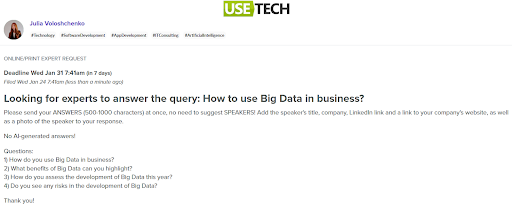A corporate blog is a great tool for promoting a business, finding new customers, developing a personal brand, and showcasing the expertise of a company and its employees. The Quora for Business blog has previously published an article on why your business needs a blog. To achieve these goals, it is necessary to create an effective content plan. But how to do it? What content should you publish and how often? Based on my experience running a corporate blog for Usetech, I would like to share tips that will help novice content marketers prepare content.
Decide on your blog topic and goals
You’ve probably already thought about what your blog will be about. What topics will you cover? For example, if your company is a marketing and advertising company, you will probably write about marketing, advertising, promotion, customer cases (with their permission), trends and analytics. Your goal may be to demonstrate your expertise, to show that your company has experience with many industries.
It is better to focus on one topic and divide it into sections. For example, within marketing, you can segment content into several sections: case studies, marketing strategy within specific industries, AI marketing use cases, etc.
Example from personal experience: Usetech develops AI-based solutions, and our articles are mostly about technologies such as AI, Big Data, Data Science, predictive analytics, and others. The materials are aimed at showing the audience the expertise of the company and its employees.

Source: Usetech Blog
Time to choose content types
Diverse content attracts different audiences and can capture their attention. To keep your blog from being monotonous, alternate between the following content types:
- Articles by your employees / articles by experts
- Articles on behalf of the CEO
- Analytical research and market information
- Trend articles (which are best written at the beginning of the year and at the end, summarizing and forecasting the next year)
- Infographics
- Interviews with industry experts and webinars
- Video content
- Downloadable content (reports, checklists)
- Article compilations of useful materials
- Podcasts
How often should you publish content?
It depends on the number of authors in your company. If you have staff writers and freelance authors, you may be able to produce several articles per month. If your company has only one person blogging, maybe one article per week is more realistic. Keep in mind that you should set aside time to gather expert comments from Qwoted or other resources, and even more time to do some research. Emphasize the quality of the material, not the quantity.
How should you prepare content and find experts for the article?
Once your article has a clear direction, how can you reach out to expert sources? Social media platforms (e.g., Quora, LinkedIn) and special sourcing resources such as HARO or Qwoted can help you with this. Based on personal experience, I recommend using Qwoted. All you have to do is create an account, choose a topic, describe your task, post a request, and wait for the experts to respond. I often use Qwoted to find experts for our corporate blog, and I would safely recommend this platform to you.

A personal example of placing a request on Qwoted
On social media, you can post a post in your group or on your personal page that you are looking for experts for an article. Or, if you know someone who can comment on the topic, you can email them right away. On Quora, you can ask questions and even request answers from specific subject matter experts so they’ll be sent the question directly.
Maximize your content’s impact with distribution
After writing and designing the article, it is important not to forget about designing the cover and then distributing the article. Publish the post on your social media channels, send the publication to the experts mentioned, and be sure to thank them for their contributions. When preparing content, also don’t forget about search engine optimization (SEO), analyze the keywords used and keep an eye on their frequency. Once the content is published, you can monitor statistics and analytics using special SEO tools.
Analyze your competitors every three months
Analyzing your competitors will allow you to be aware of what content they publish and how often, what keywords they use. Understanding what your competitors are working with will allow you to build your own unique content strategy. For example, I create a special table in which I note which blog topics my competitors cover, with what frequency they publish articles, whether they write them on their own or engage freelance writers.
Building an effective content strategy is serious work, and the better quality your content is, the more audience you will attract to your business.
Related Content

Marketing FAQ

Marketing FAQ
Book a consultation with a Quora expert
![]()

















